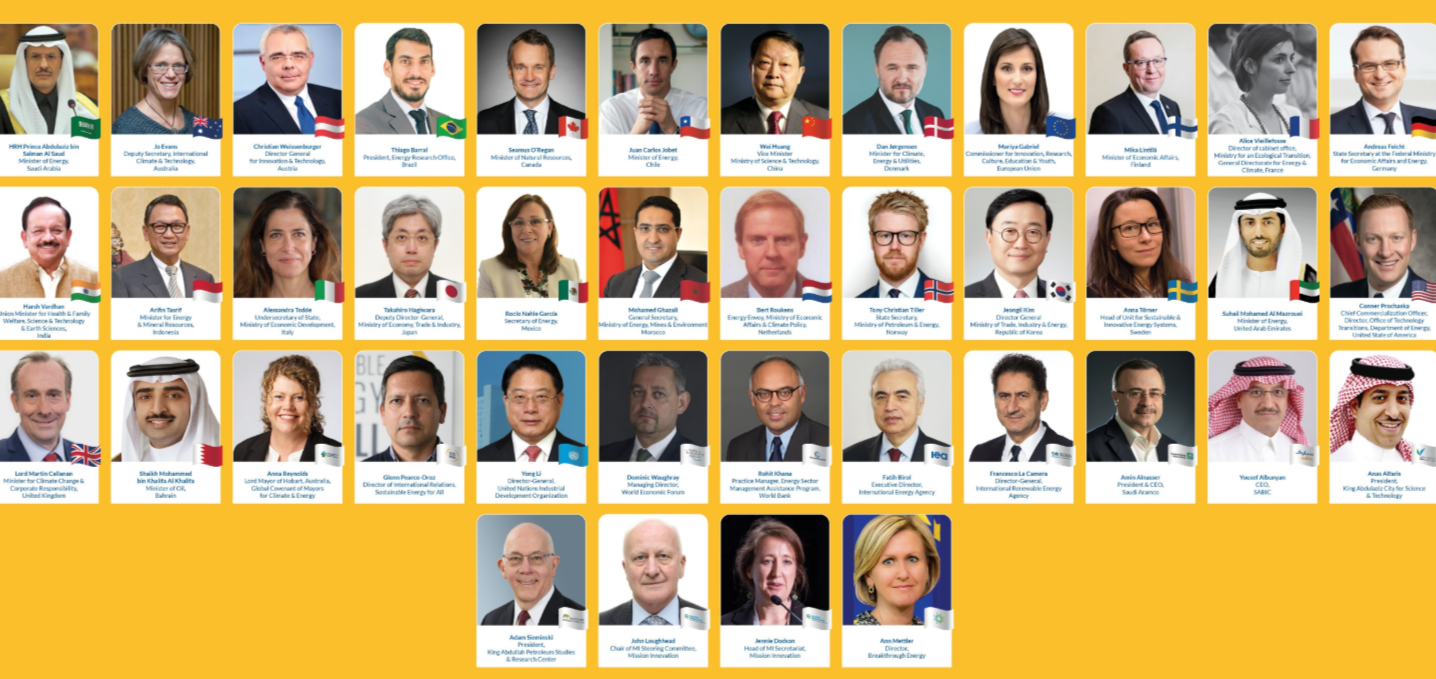Goal 1: A substantial boost in public-sector investment in clean energy R&D at the national level of MI members.
Ministers demonstrated significant progress towards MI’s goals, including announcing that
over $4 billion of additional public sector funding in clean energy innovation has been
invested during the first two years of MI.
MI members provided enhanced information on their funding figures, strategies and plans,
released in the Country Highlights 2018. This increased transparency will provide both the
public and private sector with more actionable information to improve investment decisions.
In addition, enhanced cooperation was announced with the International Energy Agency
(IEA) and International Renewable Energy (IRENA), in particular to help MI improving the
tracking of clean energy innovation
Goal 2: Increased private sector engagement and investment in energy innovation,
particularly in key Innovation Challenges.
As part of the ongoing collaboration between Mission Innovation and the World Economic
Forum, the Forum launched the White paper ‘Accelerating Sustainable Energy Innovation’
during the MI Ministerial. The paper sets out pathways to accelerate the pace of energy
innovation including six bold ideas for how governments and the private sector may work
together to step-change energy innovation.
Members announced a number of new initiatives including:
- Sweden launched two calls under a ’Challenge from Sweden’, promoting disruptive innovations through public-private procurement partnerships.
- The EU is developing new instruments, for public-private R&D co-investment, including the European Innovation Council, and will cooperate with international partners to consolidate this experience in the field of clean energy.
- India announced a new International Incubator in Clean Energy with the aim of leveraging international collaboration to support innovators that wish to scale solutions targeting India’s clean energy needs and supporting Indian clean energy innovators that wish to create impact by scaling their solutions abroad.
- A political declaration by the EC and Sweden on the role of innovation to develop sustainable battery value chains.
- Hydrogen companies and Mission Innovation governments agreed to work together to develop the hydrogen supply chain.
- Governments and industry agreed to work together to coordinate Carbon, Capture, Utilisation and Storage R&D, achieving lower costs and more efficient CO2 capture technologies.
- Ministers and CEOs agreed to work on sharing the performance of building’s data to reduce the enormous amount of energy lost by poorly performing heating and cooling systems.
Goal 3: Many new or strengthened voluntary cross-border networks and partnerships on energy innovation, greater engagement from innovators, and accelerated progress in addressing specific Innovation Challenges.
Members highlighted nearly forty international partnerships launched since the start of
Mission Innovation. New initiatives at the national and international level which will help to
deliver the Innovation Challenges were announced, include a new Innovation Challenge on
Hydrogen co-led by Australia, the EU and Germany was announced.
Notable initiatives announced included:
- The development of a partnership between the Smart Grids Innovation Challenge (IC#1) and the Bridgestone World Solar Challenge announced by Australia, to drive advancements in how electric vehicles interact with electricity networks
- A $10 million programme by Mexico to support international collaborative activity on Advancing Energy Materials discovery.
- A collaboration across the IEA Technology Collaboration Platforms to develop a ‘Comfort & Climate Box’ to integrate heating, cooling and power functions that could revolutionise the sector as a result of Heating & Cooling Innovation Challenge hosted by the co-leads UAE.
- A $5 million funding call by India on biofuels and support for a Global Cooling Prize to be delivered by the Rocky Mountain Institute.
- A “National RD&D Program on Renewable Energy and Hydrogen” by China under the Mission Innovation banner. The programme will fund RD&D activities focused on scale-application and scale-production of renewable and hydrogen, and push forward substitution in sectors of electricity, heating and fuel by renewable.
- UK and Canada are exploring opportunities for a joint–challenge on smart grids and energy storage, totalling just over £11M / $20M CDN.
- The Republic of Korea has designed a new joint research programme of 3 billion Korean Won (approximately 2.7 million US Dollars) over 3 years for collaboration between Korean and MI member researchers on any topic relevant to the MI Innovation Challenges.
- Under the Affordable Heating and Cooling in Buildings Innovation Challenge, the UK, Italy and the Netherlands agreed to work together to assess the current state of sorption heat pump technology and identify future innovation needs. This is one of the first multilateral activities emerging from the Innovation Challenges
Goal 4: Greater awareness among MI members and the wider energy community of the transformational potential of energy innovation
Mission Innovation launched the first 2020 Solutions booklet, celebrating over fifty cuttingedge breakthroughs supported by public sector investment that have the potential to rapidly
accelerate clean energy progress.
The MI Champions programme was also launched. A recognition prize program that will
celebrate and support innovative individuals who are accelerating the clean energy revolution, the ‘MI Champions’. The first cohort of Champions will be awarded at MI-4 in Vancouver.







